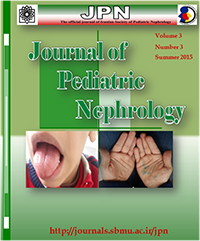The Association Between Hyponatremia and Reflux-Related Renal Injury in Acute Pyelonephritis
Journal of Pediatric Nephrology,
Vol. 3 No. 3 (2015),
6 July 2015
,
Page 104-108
https://doi.org/10.22037/jpn.v3i3.8526
Abstract
Introduction: The kidney regulates sodium balance and is the principal site of sodium excretion. Sodium is unique among electrolytes because water balance, not sodium balance, usually determines its concentration. Although water balance is usually regulated by osmolality, volume depletion stimulates thirst, renal protection of water and ADH secretion. Volume reduction has priority over osmolality; volume depletion stimulates ADH secretion, even if a patient has hyponatremia. The aim of this study was to consider scar nephropathy in children with UTI and hyponatremia and compare it with children without hyponatremia.
Material and Methods: 200 children with pyelonephritis were included in this case–control study as case and control groups, respectively. Subjects were selected from children referred to the pediatric clinic of our hospital in Arak, Iran. Case group included children with hyponatremia and UTI (with VUR) and control group included children with UTI (With VUR) and normal serum sodium. Data was analyzed using SPSS ver.18
Results: Among 200 (100%) children in both groups, 5 children (5%) had normal sodium and reflux nephropathy and 23 children had hyponatremia and reflux nephropathy.
Conclusions: Hyponatremia in children with reflux nephropathy was significantly more common than children without reflux nephropathy. The observed correlation between reflux-related injury and hyponatremia necessitates evaluation of electrolytes in children with pyelonephritis.
Keywords: Pyelonephritis; Child; Hyponatremia; Vesico-Ureteral Reflux.
How to Cite
References
Park SJ, Oh YS, Choi MJ, Shin JI, Kim KH. Hyponatremia may reflect severe inflammation in children with febrile urinary tract infection. Pediatric Nephrol. 2012; 27(12):2261-7.
Torun-Bayram M, Soylu A, Kasap-Demir B, Alaygut D, Türkmen M. Secondary pseudohypoaldosteronism caused by urinary tract infection associated with urinary tract anomalies: case reports. The Turkish journal of pediatrics 2012; 54(1):67-70.
Yousefichaijan P, Rafiei M, Eghbali A, Sharafkhah M, Taherahmadi H, Naziri M, Khalighi S. Mean Platelet Volume: A useful marker ln reflux nephropathy. J Ped. Nephrology 2014; 2 (4):137-139.
Yousefichaijan P, Cyrus A, Dorreh F, Rafiei M, Sharafkhah M, Safi F, Naziri M, Taherahmadi H. Correlation of sacral ratio and reflux – related renal injury in children with and without nephropathy. J Ped. Nephrology 2014;2(3):116-118.
Elder SJ, Vesicoureteral Reflux In: Kliegman, Stanton, St Geme, Schor, Behrman. Nelson Textbook of Pediatric 19th edition, Elsevier Saunders,2011 chapter 533,P 1834-46.
Yousefichaijan P, Cyrus A, Dorreh F, Ahmadi Mohtasham M. Comparing the sacral ratio in children with various degree of Vesicoureteral reflux with children without reflux. AMUJ 2005; 10(3):94-99.
Yousefichaijan P, et al. Sacrum index in children suffering from different grades of VUR . Pakistan journal of biological sciences; 2013.16 (11):545-547.
Yousefichaijan P. Effect factors in growth and development in children and infants with VUR. Medical Journal of Mashhad University of medical sciences 2014;l57(5):690-696.
Yousefichaijan P. Sacrum index in children suffering from different grades of VUR. Pakistan journal of biological sciences 2013;16(11):545-547.
Stajić N, Putnik J, Paripović A, Bogdanović R. [Transient pseudohypoaldosteronism]. SrpArh CelokLek 2011;139(1-2):37-43.
Park SJ, Oh YS, Choi MJ, Shin JI, Kim KH. Hyponatremia may reflect severe inflammation in children with febrile urinary tract infection. Pediatric Nephrol 2012;27(12):2261-7.
Park SJ, Shin JI. Inflammation and hyponatremia: an under recognized condition? Korean J Pediatric. 2013; 56(12):519-22.
Lim GW, Lee M, Kim HS, Hong YM, Sohn S. Hyponatremia and syndrome of inappropriate antidiuretic hormone secretion in Kawasaki disease. Korean Circ J 2010;40(10):507-13.
Mori J, Miura M, Shiro H, Fujioka K, Kohri T, Hasegawa T. Syndrome of inappropriate anti-diuretic hormone in Kawasaki disease. Pediatric Int. 2011; 53(3):354-7.
Nandagopal R, Vaidyanathan P, Kaplowitz P. Transient Pseudohypoaldosteronism due to Urinary Tract Infection in Infancy: A Report of 4 Cases. Case Report, International Journal of Pediatric Endocrinology 2009:195728.
Melzi ML1, Guez S, Sersale G, Terzi F, Secco E, Marra G, Tirelli AS, Assael BM. Acute pyelonephritis as a cause of hyponatremia/hyperkalemia in young infants with urinary tract malformations. Pediatric Infect Dis J. 1995; 14(1):56-9.
- Abstract Viewed: 1356 times
- PDF Downloaded: 292 times

